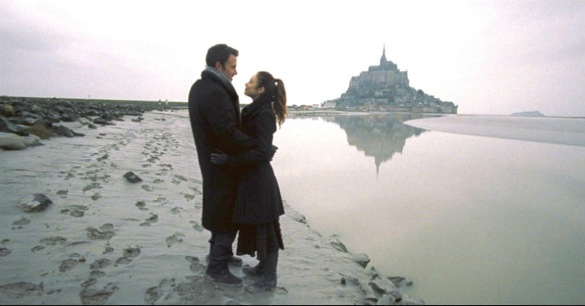To the Wonder
Waltzing. That's what Neil (Ben Affleck) does through most of Terrence Malick's latest cinematic love poem, TO THE WONDER. He waltzes across Paris and Oklahoma with Marina (Olga Kurylenko), her daughter Tatiana (Tatiana Chiline), and then later with Jane (Rachel McAdams), a childhood crush. And then Marina again. It is probably not overestimating that every 3rd shot in Malick's film is of someone dancing through the landscape: wheat fields, lakes, mowed lawns.
It would be very easy to dismiss TO THE WONDER as simply a 2 hour slide show of beautiful imagery. That it certainly is. As were the director's previous five movies. Malick's detractors cite his fixations on natural beauty: blooming flowers, swaying leaves in treetops, trickling water. The wind bent wheat was seen before, to near transcendental effect in 1978's DAYS OF HEAVEN. The upward gaze at palms was so predominant in THE THIN RED LINE. Viewers requiring A-Z narratives and brisk pacing are quick to post damning reviews, calling appreciators of the director "1st year film school fanboys." I did not see Malick's new film in the theater but can imagine that if a sizable audience did attend, many bolted for the exits within 15 minutes. I could say something snarky like, "These are the same people who skipped right to the Cliff's Notes when they got their reading list" but that might be too broad a summary. Though...if I did an exit poll......
That business out of the way, let's discuss TO THE WONDER a bit more. A film I was less than eager to see. Surprising, as I have been a huge fan of Terence Malick for decades, ever since I first saw the rural beauty of his debut, BADLANDS. I read a few synopses of WONDER and it seemed like Malick, out with a film so soon after 2011's TREE OF LIFE, might be phoning it in. Merely making up for his previous lack of prolificacy (there was a 17 year gap between DAYS OF HEAVEN and THE THIN RED LINE). In fact, the imdb reports that Malick has no less than 2 new films in production. Is age reminding the artist that his time is short? Is he motivated by fear that he may take his final breath before he expresses all his thoughts on the screen?
By the end of TO THE WONDER, any reservations of mine had long since evaporated, blown off the coast of Mont St. Michel, where Neil and Marina are first glimpsed in their love dance and where the film flashes some of its final images. It's so difficult to describe this film, almost like "dancing about architecture", other than breaking down the technical elements. The staggering cinematography, without (mostly) the benefit of artificial lighting. The deliberate zooms toward the actors, who sometimes come running back toward the lens. They are mostly captured with wide smiles and embraces. A collection of images that might race through the recollection of the lovelorn as they trace the early stages of courtship, where lovers act silly and dance "like no one's watching."
The dancing continues as Marina and Tatiana join Neil in the U.S., in a banal community of look-alike homes and flat plains, yet somehow almost as beautiful as the streetlight smeared palate of Paris. Malick's ability to make anything (even a house under construction) patently cinematic is the mark of a true artist. But eventually, reality sours the dream: droning familiarity and cultural differences tear the lovers apart. There are fewer smiles. There is yelling. No shot lasts more than a few seconds. Dialogue is only half heard, as if from another room, or in a daydream. Tatiana is homesick. Marina's visa expires.
Later, Neil runs into Jane. They reminisce. Soon, they're embracing, much the same as what we saw earlier. But their dance is also short-lived as Marina, bored and jobless back in Paris, returns to Oklahoma and Neil. They marry. The earth lights up again, and then the embers lose their glow.
Every so often, Malick cuts to another figure whose romance has cooled. Father Quintana (Javier Bardem) methodically goes through the motions in his church. In voiceover, he laments to his Savior. Frequently quotes Isiah and the Psalms. He doesn't exactly cry out, but rather sadly acknowledges his fading faith. Watches it slowly drown. Perhaps helplessly. He's still out in the community, listening to neighbors, mostly destitute and broken in a thousand ways. He visits the prison. In one of the film's most startling sequences, an emaciated woman is first glimpsed throwing down the Bible given to her, then a scene or 2 later is banging on the Father's door, pleading for entrance, in some of the strongest Christian imagery I can recall in a secular film.
The priest will interact with the main characters. But what does he know of marital strife? Of how to handle a broken heart after infidelity? He does know of a wounded relationship, of betrayal. Of being far from home. This he shares with them. We don't really hear his words of comfort to the lovers. But each moves on. Reaching and perhaps finding a return to the wonder.



Comments